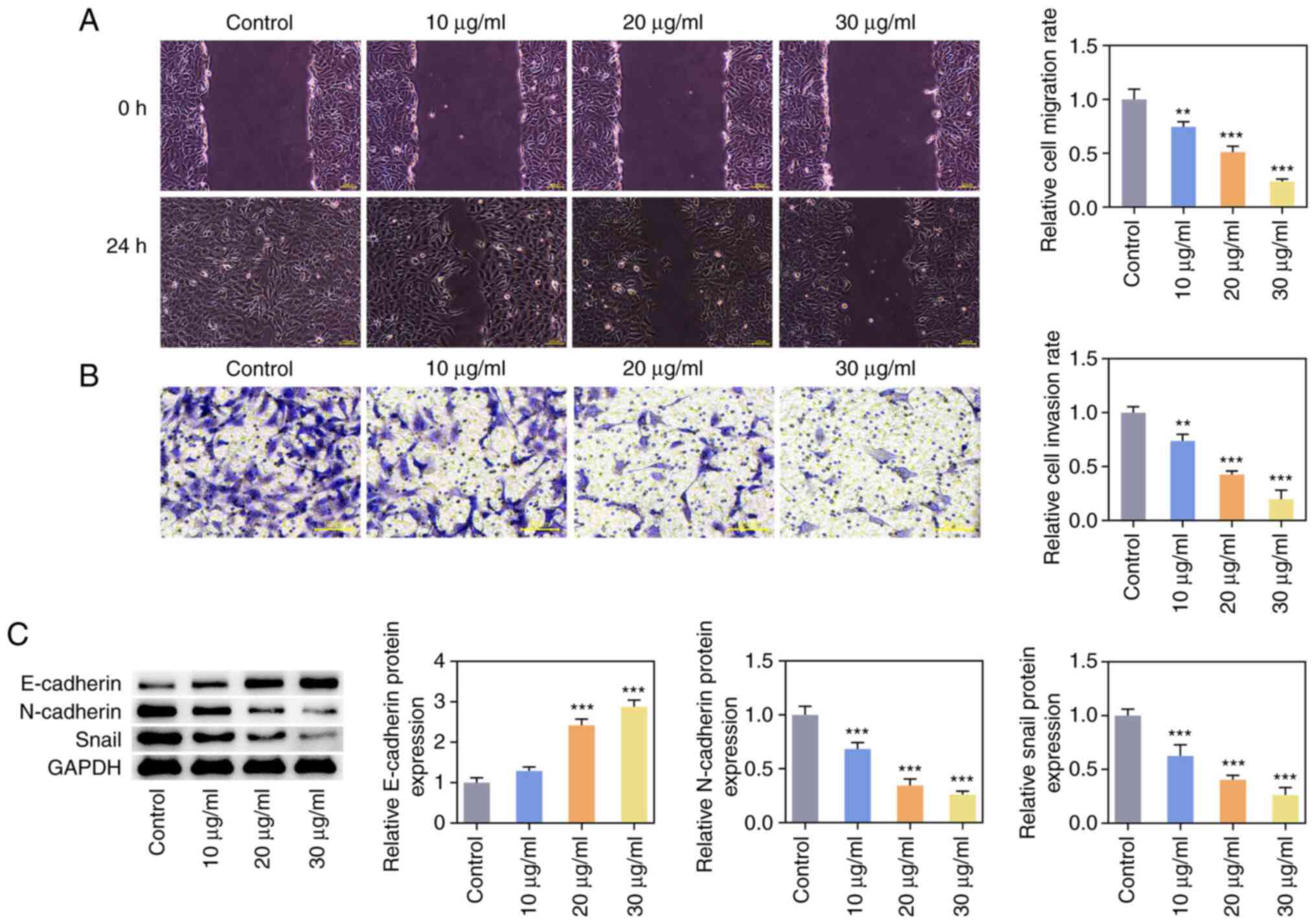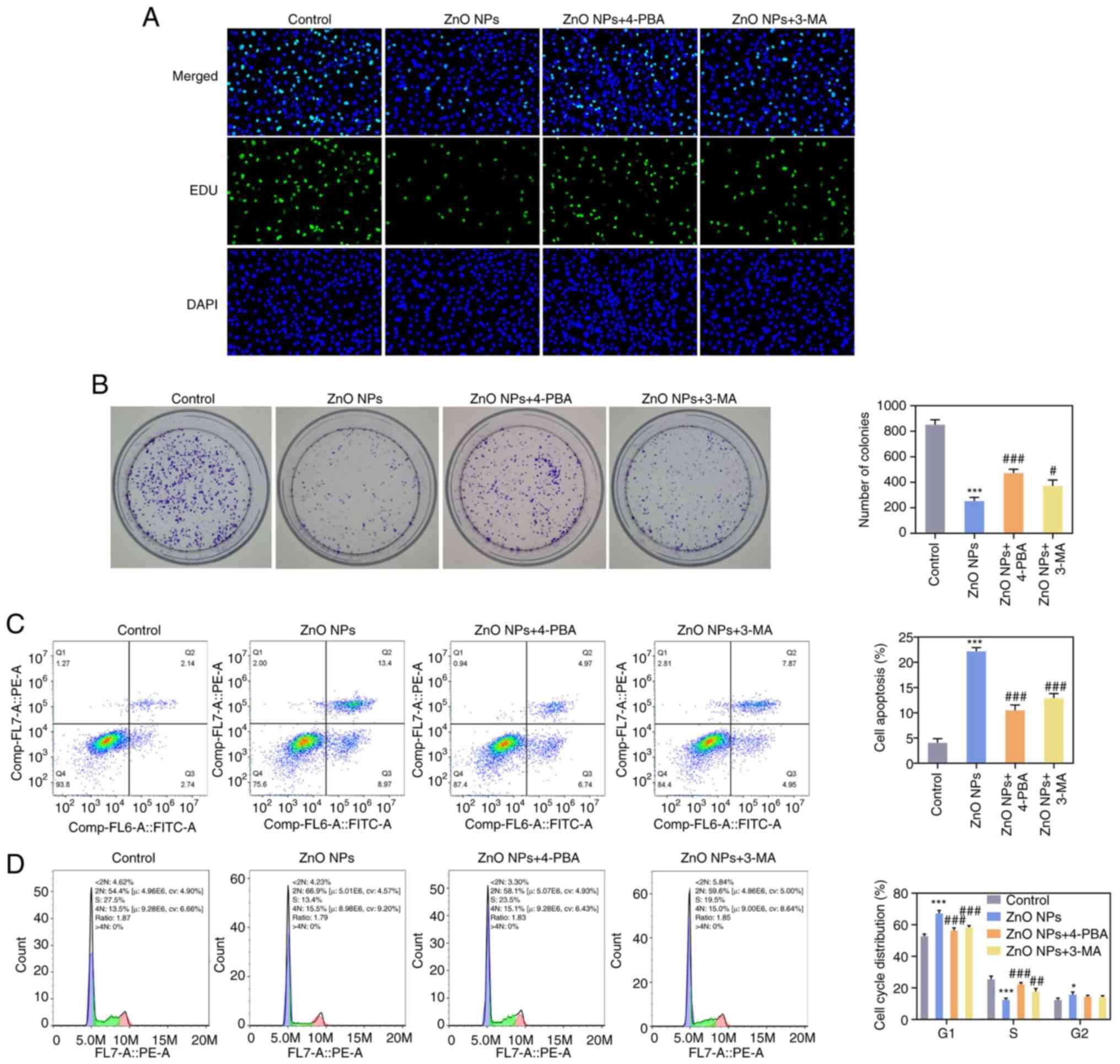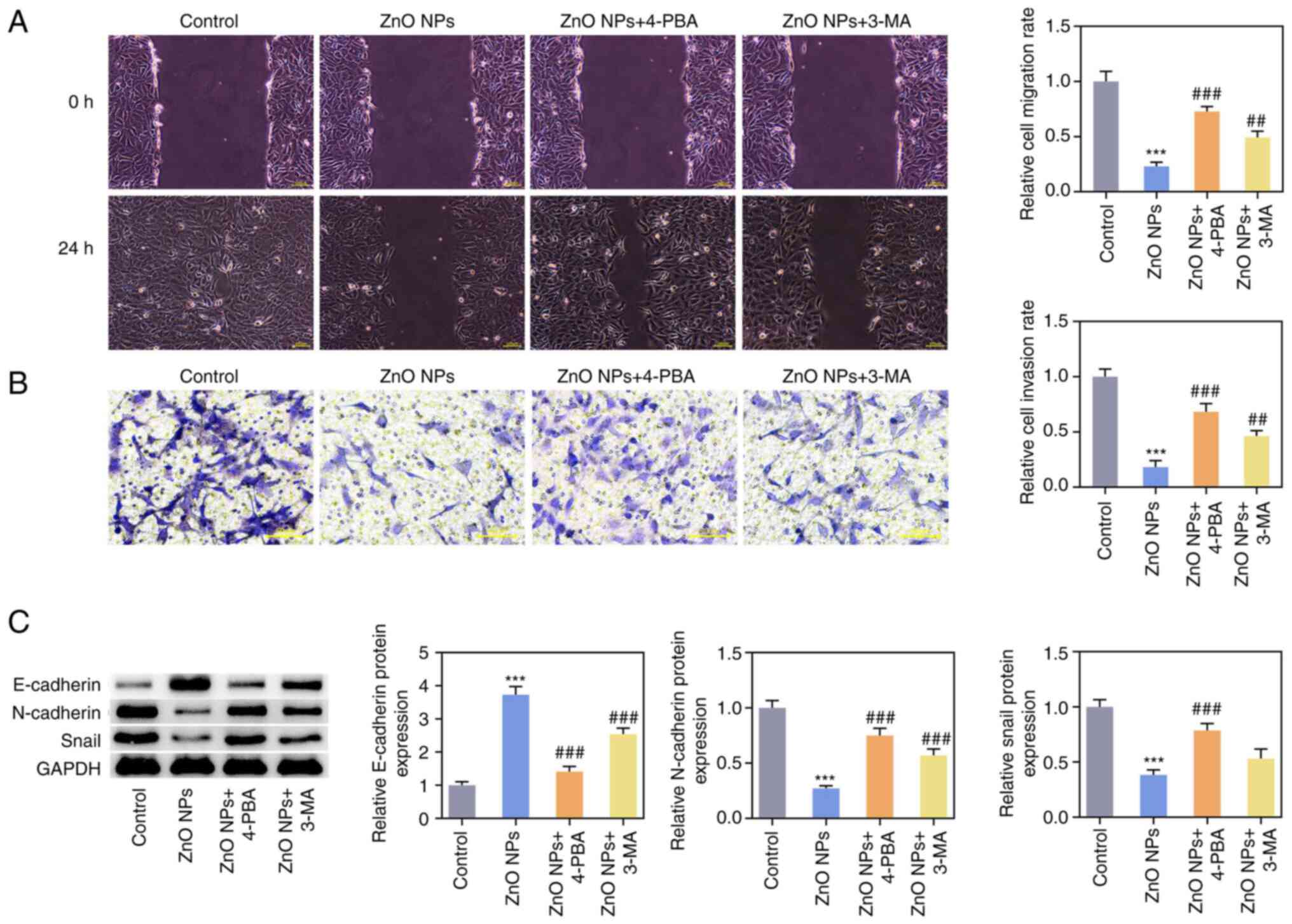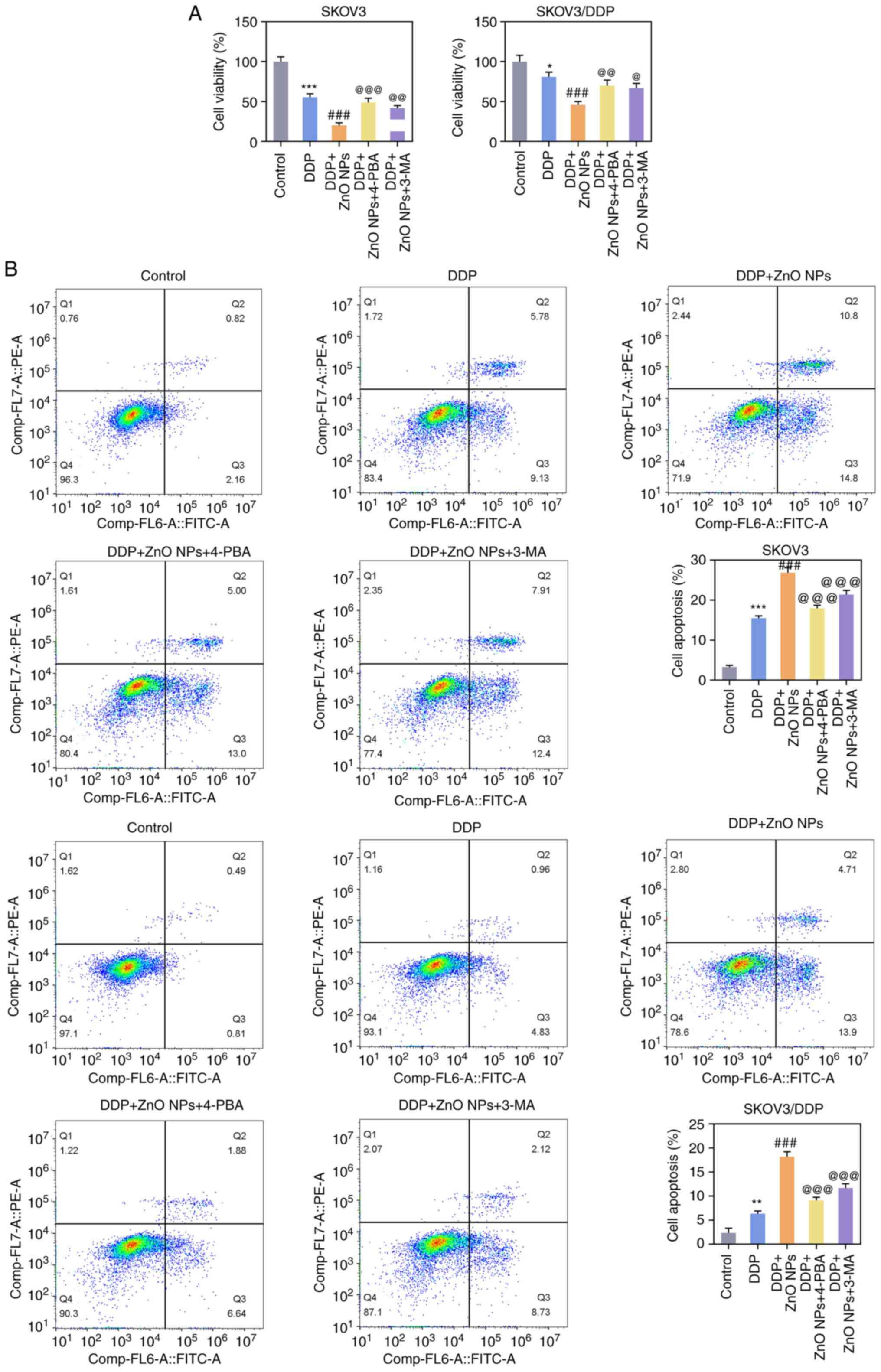|
1
|
Penny SM: Ovarian Cancer: An Overview.
Radiol Technol. 91:561–575. 2020.PubMed/NCBI
|
|
2
|
Sung H, Ferlay J, Siegel RL, Laversanne M,
Soerjomataram I, Jemal A and Bray F: Global cancer statistics 2020:
GLOBOCAN estimates of incidence and mortality worldwide for 36
cancers in 185 countries. CA Cancer J Clin. 71:209–249.
2020.PubMed/NCBI View Article : Google Scholar
|
|
3
|
Orr B and Edwards RP: Diagnosis and
treatment of ovarian cancer. Hematol Oncol Clin North Am.
32:943–964. 2018.PubMed/NCBI View Article : Google Scholar
|
|
4
|
Ray-Coquard I, Mirza MR, Pignata S,
Walther A, Romero I and du*Bois A: Therapeutic options following
second-line platinum-based chemotherapy in patients with recurrent
ovarian cancer: Comparison of active surveillance and maintenance
treatment. Cancer Treat Rev. 90(102107)2020.PubMed/NCBI View Article : Google Scholar
|
|
5
|
Mabrouk M, Das DB, Salem ZA and Beherei
HH: Nanomaterials for biomedical applications: Production,
characterisations, recent trends and difficulties. Molecules.
26(1077)2021.PubMed/NCBI View Article : Google Scholar
|
|
6
|
Yan M and Majd MH: Evaluation of induced
apoptosis by biosynthesized zinc oxide nanoparticles in MCF-7
breast cancer cells using Bak1 and Bclx expression. Dokl Biochem
Biophys. 500:360–367. 2021.PubMed/NCBI View Article : Google Scholar
|
|
7
|
Anjum S, Hashim M, Malik SA, Khan M,
Lorenzo JM, Abbasi BH and Hano C: Recent advances in zinc oxide
nanoparticles (ZnO NPs) for cancer diagnosis, target drug delivery,
and treatment. Cancers (Basel). 13(4570)2021.PubMed/NCBI View Article : Google Scholar
|
|
8
|
Padmanabhan A, Kaushik M, Niranjan R,
Richards JS, Ebright B and Venkatasubbu GD: Zinc Oxide
nanoparticles induce oxidative and proteotoxic stress in ovarian
cancer cells and trigger apoptosis Independent of p53-mutation
status. Appl Surf Sci. 487:807–818. 2019.PubMed/NCBI View Article : Google Scholar
|
|
9
|
Hu C and Du W: Zinc oxide nanoparticles
(ZnO NPs) combined with cisplatin and gemcitabine inhibits tumor
activity of NSCLC cells. Aging (Albany NY). 12:25767–25777.
2020.PubMed/NCBI View Article : Google Scholar
|
|
10
|
Sehrawat A, Mishra J, Mastana SS, Navik U,
Bhatti GK, Reddy PH and Bhatti JS: Dysregulated autophagy: A key
player in the pathophysiology of type 2 diabetes and its
complications. Biochim Biophys Acta Mol Basis Dis.
1869(166666)2023.PubMed/NCBI View Article : Google Scholar
|
|
11
|
Wilson N, Kataura T, Korsgen ME, Sun C,
Sarkar S and Korolchuk VI: The autophagy-NAD axis in longevity and
disease. Trends Cell Biol. 33:788–802. 2023.PubMed/NCBI View Article : Google Scholar
|
|
12
|
Onorati AV, Dyczynski M, Ojha R and
Amaravadi RK: Targeting autophagy in cancer. Cancer. 124:3307–3318.
2018.PubMed/NCBI View Article : Google Scholar
|
|
13
|
Jain V, Singh MP and Amaravadi RK: Recent
advances in targeting autophagy in cancer. Trends Pharmacol Sci.
44:290–302. 2023.PubMed/NCBI View Article : Google Scholar
|
|
14
|
Debnath J, Gammoh N and Ryan KM: Autophagy
and autophagy-related pathways in cancer. Nat Rev Mol Cell Biol.
24:560–575. 2023.PubMed/NCBI View Article : Google Scholar
|
|
15
|
Lopez-Mendez TB, Sánchez-Álvarez M,
Trionfetti F, Pedraz JL, Tripodi M, Cordani M, Strippoli R and
González-Valdivieso J: Nanomedicine for autophagy modulation in
cancer therapy: A clinical perspective. Cell Biosci.
13(44)2023.PubMed/NCBI View Article : Google Scholar
|
|
16
|
Liu L, Wang J, Zhang J, Huang C, Yang Z
and Cao Y: The cytotoxicity of zinc oxide nanoparticles to 3D brain
organoids results from excessive intracellular zinc ions and
defective autophagy. Cell Biol Toxicol. 39:259–275. 2023.PubMed/NCBI View Article : Google Scholar
|
|
17
|
Cubillos-Ruiz JR, Bettigole SE and
Glimcher LH: Tumorigenic and immunosuppressive effects of
endoplasmic reticulum stress in cancer. Cell. 168:692–706.
2017.PubMed/NCBI View Article : Google Scholar
|
|
18
|
Sisinni L, Pietrafesa M, Lepore S,
Maddalena F, Condelli V, Esposito F and Landriscina M: Endoplasmic
reticulum stress and unfolded protein response in breast cancer:
The balance between apoptosis and autophagy and its role in drug
resistance. Int J Mol Sci. 20(857)2019.PubMed/NCBI View Article : Google Scholar
|
|
19
|
Luo Y, Wu C, Liu L, Gong Y, Peng S, Xie Y
and Cao Y: 3-Hydroxyflavone enhances the toxicity of ZnO
nanoparticles in vitro. J Appl Toxicol. 38:1206–1214.
2018.PubMed/NCBI View
Article : Google Scholar
|
|
20
|
Gu WL, Li H, Niu X and Zhou J: Biological
fabrication of zinc oxide nanoparticles from Nepeta cataria
potentially produces apoptosis through inhibition of proliferative
markers in ovarian cancer. Green Process Synth. 11:316–326.
2022.
|
|
21
|
Ma YY, Di ZM, Cao Q, Xu WS, Bi SX, Yu JS,
Shen YJ, Yu YQ, Shen YX and Feng LJ: Xanthatin induces glioma cell
apoptosis and inhibits tumor growth via activating endoplasmic
reticulum stress-dependent CHOP pathway. Acta Pharmacol Sin.
41:404–414. 2020.PubMed/NCBI View Article : Google Scholar
|
|
22
|
Zhang Q, Wang X, Cao S, Sun Y, He X, Jiang
B, Yu Y, Duan J, Qiu F and Kang N: Berberine represses human
gastric cancer cell growth in vitro and in vivo by inducing
cytostatic autophagy via inhibition of MAPK/mTOR/p70S6K and Akt
signaling pathways. Biomed Pharmacother. 128(110245)2020.PubMed/NCBI View Article : Google Scholar
|
|
23
|
Torre LA, Trabert B, DeSantis CE, Miller
KD, Samimi G, Runowicz CD, Gaudet MM, Jemal A and Siegel RL:
Ovarian cancer statistics, 2018. CA Cancer J Clin. 68:284–296.
2018.PubMed/NCBI View Article : Google Scholar
|
|
24
|
Kathawala RJ, Kudelka A and Rigas B: The
chemoprevention of ovarian cancer: The need and the options. Curr
Pharmacol Rep. 4:250–260. 2018.PubMed/NCBI View Article : Google Scholar
|
|
25
|
Giornelli GH: Management of relapsed
ovarian cancer: A review. Springerplus. 5(1197)2016.PubMed/NCBI View Article : Google Scholar
|
|
26
|
Virych PA, Zadvorniy TV, Borikun TV,
Lykhova OO, Chumachenko VA, Virych PA, Pavlenko VA, Kutsevol NV and
Lukianova NY: Effects of dextran-graft-polyacrylamide/ZnO
nanoparticles on prostate cancer cell lines in vitro. Exp Oncol.
44:217–221. 2022.PubMed/NCBI View Article : Google Scholar
|
|
27
|
Wang P, Hu G, Zhao W, Du J, You M, Xv M,
Yang H, Zhang M, Yan F, Huang M, et al: Continuous ZnO nanoparticle
exposure induces melanoma-like skin lesions in epidermal barrier
dysfunction model mice through anti-apoptotic effects mediated by
the oxidative stress-activated NF-κB pathway. J Nanobiotechnology.
20(111)2022.PubMed/NCBI View Article : Google Scholar
|
|
28
|
Fan P, Yang C, Wang L, Wang Q, Zhang Y,
Zhou J, Weng J and Feng B: ZnO nanoparticles stimulate oxidative
stress to induce apoptosis of B16F10 melanoma cells:In vitroandin
vivostudies. Biomed Phys Eng Express. 7:2021.PubMed/NCBI View Article : Google Scholar
|
|
29
|
Khan MS, Altwaijry N, Jabir NR, Alamri AM,
Tarique M and Khan AU: Potential of green-synthesized ZnO-NPs
against human ovarian teratocarcinoma: An in vitro study. Mol Biol
Rep. 50:4447–4457. 2023.PubMed/NCBI View Article : Google Scholar
|
|
30
|
Bai DP, Zhang XF, Zhang GL, Huang YF and
Gurunathan S: Zinc oxide nanoparticles induce apoptosis and
autophagy in human ovarian cancer cells. Int J Nanomedicine.
12:6521–6535. 2017.PubMed/NCBI View Article : Google Scholar
|
|
31
|
Saraswat Ohri S, Mullins A, Hetman M and
Whittemore SR: Activating transcription factor-6α deletion
modulates the endoplasmic reticulum stress response after spinal
cord injury but does not affect locomotor recovery. J Neurotrauma.
35:486–491. 2018.PubMed/NCBI View Article : Google Scholar
|
|
32
|
Bahar E, Kim JY and Yoon H: Chemotherapy
resistance explained through endoplasmic reticulum stress-dependent
signaling. Cancers (Basel). 11(338)2019.PubMed/NCBI View Article : Google Scholar
|
|
33
|
Du J, Song D, Cao T, Li Y, Liu J, Li B and
Li L: Saikosaponin-A induces apoptosis of cervical cancer through
mitochondria- and endoplasmic reticulum stress-dependent pathway in
vitro and in vivo: Involvement of PI3K/AKT signaling pathway. Cell
Cycle. 20:2221–2232. 2021.PubMed/NCBI View Article : Google Scholar
|
|
34
|
Piao MJ, Han X, Kang KA, Fernando PDSM,
Herath HMUL and Hyun JW: The endoplasmic reticulum stress response
mediates shikonin-induced apoptosis of 5-fluorouracil-resistant
colorectal cancer cells. Biomol Ther (Seoul). 30:265–273.
2022.PubMed/NCBI View Article : Google Scholar
|
|
35
|
Rezghi Barez S, Movahedian Attar A and
Aghaei M: MicroRNA-30c-2-3p regulates ER stress and induces
apoptosis in ovarian cancer cells underlying ER stress. EXCLI J.
20:922–934. 2021.PubMed/NCBI View Article : Google Scholar
|
|
36
|
Xu J, Bi G, Luo Q, Liu Y, Liu T, Li L,
Zeng Q, Wang Q, Wang Y, Yu J and Yi P: PHLDA1 Modulates the
endoplasmic reticulum stress response and is required for
resistance to oxidative stress-induced cell death in human ovarian
cancer cells. J Cancer. 12:5486–5493. 2021.PubMed/NCBI View Article : Google Scholar
|
|
37
|
Fang L, Zhou Y, Cao H, Wen P, Jiang L, He
W, Dai C and Yang J: Autophagy attenuates diabetic glomerular
damage through protection of hyperglycemia-induced podocyte injury.
PLoS One. 8(e60546)2013.PubMed/NCBI View Article : Google Scholar
|
|
38
|
Baek AR, Hong J, Song KS, Jang AS, Kim DJ,
Chin SS and Park SW: Spermidine attenuates bleomycin-induced lung
fibrosis by inducing autophagy and inhibiting endoplasmic reticulum
stress (ERS)-induced cell death in mice. Exp Mol Med. 52:2034–2045.
2020.PubMed/NCBI View Article : Google Scholar
|
|
39
|
Wu H, Li W, Wang T, Rong Y, He Z, Huang S,
Zhang L, Wu Z and Liu C: α-Tomatine, a novel early-stage autophagy
inhibitor, inhibits autophagy to enhance apoptosis via Beclin-1 in
Skov3 cells. Fitoterapia. 152(104911)2021.PubMed/NCBI View Article : Google Scholar
|
|
40
|
Zhou Y, Wang C, Ding J, Chen Y, Sun Y and
Cheng Z: miR-133a targets YES1 to reduce cisplatin resistance in
ovarian cancer by regulating cell autophagy. Cancer Cell Int.
22(15)2022.PubMed/NCBI View Article : Google Scholar
|
|
41
|
Hollister R: Critical incident stress
debriefing and the community health nurse. J Community Health Nurs.
13:43–49. 1996.PubMed/NCBI View Article : Google Scholar
|





















